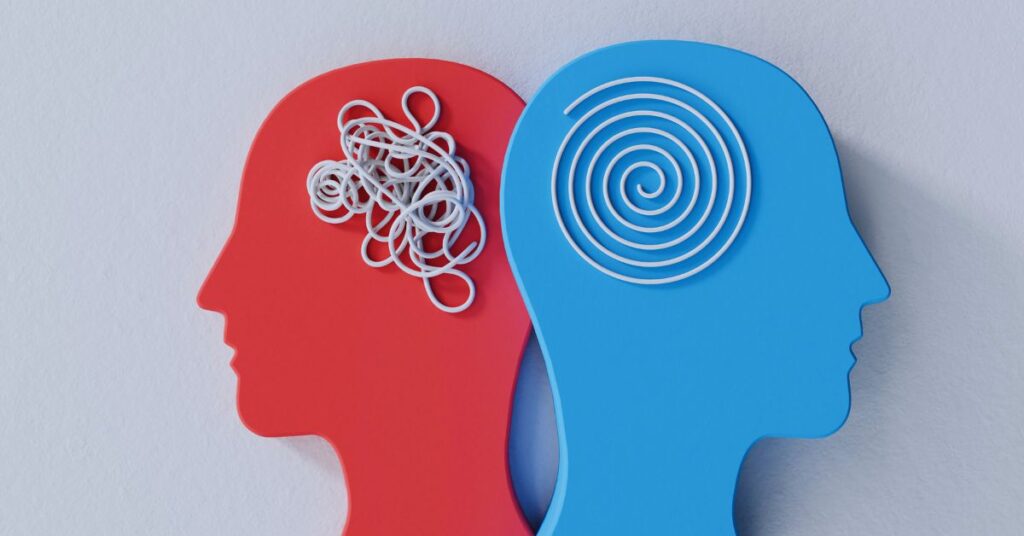Mental health and emotional health are often used interchangeably. However, they are distinct concepts.
Understanding the difference between mental health and emotional health is crucial. Mental health refers to cognitive functions, thoughts, and behaviors. Emotional health focuses on feelings and how we manage them. These two aspects of well-being are interconnected yet separate. Knowing their differences can help improve overall health.
This blog will explore the distinctions and how they impact daily life. Let’s dive in and understand these key components of well-being.
Topic of Contents
ToggleMental Health Basics
Mental health is an essential part of our overall well-being. It affects how we think, feel, and act in daily life. Understanding mental health basics can help us better care for ourselves and others.
Key Components
Mental health includes our emotional, psychological, and social well-being. It influences how we handle stress, relate to others, and make choices. Several factors contribute to mental health, such as life experiences, family history, and biological factors.
Good mental health allows us to cope with life’s challenges. It helps us build strong relationships and recover from setbacks. Maintaining mental health requires regular self-care and seeking help when needed.
Common Disorders
Several common disorders affect mental health. Anxiety disorders, like generalized anxiety and panic disorder, cause excessive worry and fear. Mood disorders, including depression and bipolar disorder, affect how we feel and function. Eating disorders impact our relationship with food and body image.
Other disorders include obsessive-compulsive disorder (OCD), post-traumatic stress disorder (PTSD), and schizophrenia. Each disorder has unique symptoms and treatment options. Understanding these can help in recognizing and addressing mental health issues early.
Emotional Health Fundamentals
Understanding emotional health is crucial for overall well-being. Emotional health refers to the ability to manage and express emotions effectively. It involves recognizing, understanding, and accepting one’s feelings. It also includes the capacity to cope with life’s challenges in a healthy way.
Core Elements
Emotional health includes several core elements. First, self-awareness. This means knowing your emotions and how they affect your thoughts and actions. Second, self-regulation. This involves managing your emotions, especially during stressful times. Third, empathy. It is the ability to understand and share the feelings of others.
Another key element is social skills. These include effective communication and relationship-building. Positive thinking is also important. It helps in maintaining a balanced outlook on life. Lastly, resilience. This is the ability to bounce back from setbacks and challenges.
Typical Challenges
Many people face challenges in maintaining emotional health. Stress is a common issue. It can stem from work, relationships, or financial problems. Anxiety is another challenge. It often results from fear of the unknown or constant worry.
Depression is a significant challenge. It affects one’s mood and overall outlook on life. Anger management can also be difficult. Uncontrolled anger can lead to conflicts and affect relationships. Lastly, loneliness. It can result in feelings of isolation and sadness.
Interrelation Between Mental And Emotional Health
Mental health and emotional health often influence each other. They are closely connected. Understanding this connection can help improve overall well-being.
How They Influence Each Other
Mental health involves how we process thoughts and handle information. Emotional health involves how we manage and express feelings. When mental health is poor, it can lead to negative emotions. Similarly, poor emotional health can lead to mental stress.
Here are some examples of how they influence each other:
- Stressful thoughts can cause anxiety and sadness.
- Positive thinking can boost mood and reduce stress.
- Negative emotions can cloud judgment and affect decision-making.
Examples Of Interconnectedness
Consider a stressful work situation. It can cause mental strain. This mental strain can lead to feeling overwhelmed. Feeling overwhelmed is an emotional response.
| Mental Health | Emotional Health |
|---|---|
| Overthinking | Feeling anxious |
| Focus and clarity | Feeling calm |
| Confusion | Feeling frustrated |
Another example is depression. Depression impacts both mental and emotional health. It involves negative thoughts and feelings of sadness. Addressing both aspects can lead to better outcomes.
Therefore, supporting one can often help the other. Engaging in mental exercises can improve emotional health. Likewise, managing emotions well can improve mental clarity.
Signs Of Mental Health Issues
Understanding the signs of mental health issues is crucial. These signs can manifest in various ways, affecting behavior, thoughts, and emotions. Recognizing these indicators early can lead to better outcomes. Below, we will explore some common behavioral and cognitive symptoms that may signal mental health concerns.
Behavioral Indicators
Changes in behavior are often the first signs. These may include withdrawing from social activities. A person might also display extreme mood swings. Other indicators include sudden outbursts of anger or sadness. Neglecting responsibilities is another sign. This includes work, school, or personal duties. Noticeable changes in sleep patterns can also occur. This could mean sleeping too much or too little.
Cognitive Symptoms
Mental health issues can impact thought processes. Difficulty concentrating is a common symptom. This can affect daily tasks and decision-making. Persistent negative thoughts are another sign. These thoughts may focus on self-worth or hopelessness. Memory problems might also arise. Forgetting important details or events can be a red flag. Struggling to understand or process information is another symptom. This can make learning new things challenging.
Signs Of Emotional Health Issues
Understanding the signs of emotional health issues can help you take better care of yourself. Emotional health impacts how you feel, think, and handle stress. Recognizing these signs early on can make a significant difference in your overall well-being.
Emotional Responses
Emotional health issues often present through various emotional responses. These responses can include:
- Persistent sadness or feelings of hopelessness
- Excessive irritability or anger
- Feeling overwhelmed by everyday tasks
- Increased anxiety or worry
- Difficulty concentrating or making decisions
These emotional responses can affect your daily life. It is important to pay attention to these changes.
Physical Manifestations
Emotional health issues can also show up through physical manifestations. These can often be overlooked but are important to recognize:
- Frequent headaches or migraines
- Changes in sleep patterns, such as insomnia or oversleeping
- Unexplained aches and pains
- Changes in appetite or weight
- Increased fatigue or lack of energy
Physical symptoms can be a sign of underlying emotional issues. Addressing these symptoms can improve both emotional and physical health.
Improving Mental Health
Improving mental health is vital for overall well-being. It helps in managing stress, enhancing mood, and increasing productivity. This section will explore effective methods to boost mental health.
Therapeutic Approaches
Therapy can help address mental health issues. Cognitive Behavioral Therapy (CBT) is popular. It helps identify and change negative thought patterns. Another approach is talk therapy. It provides a safe space to discuss feelings. Therapy can be done individually or in a group.
Self-care Techniques
Self-care techniques play a crucial role. Regular exercise improves mood. A balanced diet supports brain function. Mindfulness and meditation reduce stress. Good sleep is essential for mental health. Connecting with loved ones boosts emotional support.
Boosting Emotional Health
Boosting emotional health is essential for a balanced life. Emotional health involves how you understand and manage your feelings. It affects your relationships and daily activities. Improving emotional health can lead to better stress management and increased resilience.
Mindfulness Practices
Mindfulness helps you stay present and aware. Simple exercises, like deep breathing, can calm your mind. Focus on your breath for a few minutes each day. Notice how it feels to inhale and exhale. This practice can reduce stress.
Another mindfulness technique is a body scan. Lie down and close your eyes. Pay attention to each part of your body from head to toe. Notice any tension and let it go. This practice can help you relax and be more in tune with your body.
Relationship Building
Strong relationships are vital for emotional health. They provide support and help you feel connected. To build strong relationships, communicate openly and honestly. Share your feelings and listen to others. This creates trust and understanding.
Spend quality time with friends and family. Engage in activities you enjoy together. This can strengthen your bonds and improve your mood. Remember, relationships need effort and care. Invest time and energy in them for lasting connections.
When To Seek Professional Help
Understanding when to seek professional help for mental and emotional health is crucial. It can make a significant difference in your overall well-being. Knowing the signs and available resources empowers you to take the right steps.
Recognizing The Need
Many people struggle to know when to seek help. If you feel overwhelmed by daily tasks, it might be time. Persistent sadness or anxiety can also be indicators. Pay attention to changes in sleep or appetite. Difficulty concentrating or extreme mood swings are also signs.
If you feel detached from reality or have thoughts of self-harm, seek help immediately. Loneliness or feeling disconnected from loved ones are warning signs. Recognizing these symptoms early can prevent more serious issues later.
Available Resources
There are many resources available for mental and emotional health support. Therapists and counselors offer professional guidance. They help you understand and manage your feelings. Psychiatrists can provide medication if needed.
Support groups offer a community of people with similar experiences. They can provide comfort and advice. Online resources and hotlines are also valuable. They offer immediate support and information.
Don’t hesitate to reach out for help. Taking the first step can improve your mental and emotional health. Remember, seeking help is a sign of strength, not weakness.
Frequently Asked Questions
What Is Mental Health?
Mental health involves our cognitive, behavioral, and emotional well-being. It impacts how we think, feel, and act. It also affects how we handle stress, relate to others, and make choices.
What Is Emotional Health?
Emotional health refers to our ability to manage and express our emotions. It includes recognizing, understanding, and responding to our feelings. It also involves coping with life’s challenges and maintaining positive relationships.
How Do Mental And Emotional Health Differ?
Mental health focuses on cognitive and behavioral functions. Emotional health is about managing and expressing emotions. Both are interconnected but address different aspects of overall well-being.
Can Mental Health Impact Emotional Health?
Yes, poor mental health can affect emotional health. When mental health issues arise, they can disrupt emotional stability. Both aspects influence each other significantly.
Conclusion
Understanding the difference between mental and emotional health is vital. Mental health involves cognitive processes like thinking and memory. Emotional health focuses on feelings and moods. Both are crucial for overall well-being. They often overlap and influence each other. Prioritize care for both aspects to lead a balanced life.
Seek professional help if needed. Small steps can make a big difference. Stay mindful and take action for better health.







